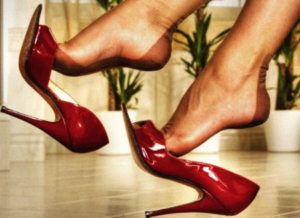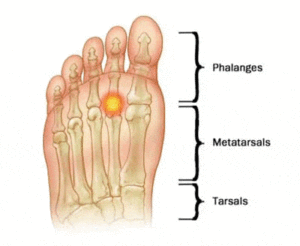
As podiatrists we treat all things related to the foot. We regularly consult with women who arrive with forefoot pain which has occurred more than once and coincides with the use of a particular pair of shoes (usually heels)! Metatarsalgia is the topic for today – the broad term encompassing all conditions related to pain around the metatarsal heads. We are going to focus on the most common form of metatarsalgia (capsulitis) which may occur following a big night out in heels, and most importantly what to do if you get it!

Capsulitis of the forefoot occurs when one or more of the metatarsophalangeal joint capsules becomes inflamed. It is most commonly situated around the 2nd toe joint as many people have a long 2nd metatarsal bone and when wearing a high heeled shoe there is increased load to that area. Capsulitis to the forefoot often feels like you have stepped on a stone and it may also feel restricted due to increased swelling around the joint. So what do you do if you think you have capsulitis?

- Ice the area for 20 minutes using an ice pack. You should repeat this a couple of times per day for a few days if the pain is severe.
- Drop the height of your footwear and avoid hard leather soled shoes. Aim to use street shoes or joggers that have a cushioned midsole as much as possible until the pain fully subsides.
- Stretch your calf muscles a couple of times per day. Make sure that you hold the stretch for at least 30 seconds.
- Stretch the tendons on top of the foot as well. Prolonged use of high heels causes tightening and ultimately shortening of the tendon which may lead to retracted (triggered) toes and increased load to the metatarsal joint capsule. To do this stretch sit down and remove your shoes. Point your toes and apply gentle pressure to the forefoot encouraging the toes to move towards the sole of the foot. This is a forced point stretch which helps to create balance in the extensor and flexor tendons of the foot.
- Seek podiatric assessment if you have no improvement in your symptoms or they are severe. You may have a different injury that requires a different treatment!
So pay attention ladies if the balls of your feet hurt. Don’t let sore feet ruin your festive season!
Until next time.
E&E


